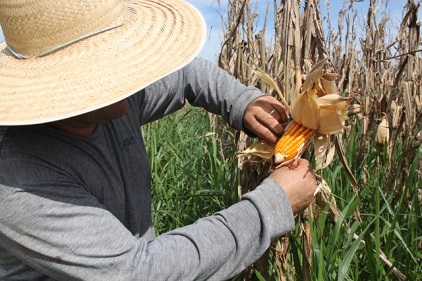In 2018, projects will reach Africa and poor communities in Piauí
In 2018, projects will reach Africa and poor communities in Piauí
Photo: Keyle Barbosa de Menezes

The soil-water-plant management system for maize will be included in the research activities
This year, technologies developed by Embrapa Mid-North in the areas of animal and food production will start to benefit smallholders from countries like Uganda, Cameroon, Ethiopia, Ghana and Tanzania, in Africa. The project Poverty Reduction and Food Security in Africa, which will go on until 2019, establishes that at least 150 observation and technology transfer units will be set up. Funded by the Bill and Melinda Gates Foundation, the action has a budget of 695,000 dollars.
The central idea of the project, according to the researcher César Nogueira, is to use a solar energy-based pulsator or pump in each unit to supply Integrated Crop-Livestock and the Embrapa "Sisteminha" production systems. The latter, according to Nogueira, consists in farming fish in tanks while reusing the water for plant and animal production in the neighboring areas. “We anticipate important positive impacts in the food security, health, and in the economy of these countries”, he said.
Another five projects will also be led by Embrapa this year in the Mid-North region of Brazil. In the Cerrados biome, the bet is on the Management of the Soil-Water-Plant System for Maize. Led by the researcher Edson Bastos, the work is going to focus on the identification of the population and plant spacing; economic doses of potassium and nitrogen; strains of diazotrophic bacteria to compose inoculantes; and irrigation depths for the cultivation of fresh and dry corn.
According to Bastos, the research results will allow the “improvement of the maize production system in the region, with the expectation that the average grains yield doubles and thus consolidates the agrobusiness of the crop in the Cerrados in Piauí and Maranhão states.
Also in the Cerrados and in the Parnaíba river delta, there will be the second stage of the project Suitability of the Management and Value-Appreciation of Honey with three stingless Bee Species, as economic alternative for smallholders.The project is led by the researcher Fábia de Mello Pereira.
Strategies for the Sustainability of the Production of Irrigated Organic Acerola in the Northeast, led by the researcher Braz Henrique Nunes; and Technological Bases for the Sustainable Production of native oysters in Brazil's North and Northeast. The researcher Angela Puchnick Legat is the leader.
Regarding the project on organic cultivation of acerola (also known as Barbados cherry), Nunes expects positive impacts with suitable water management and application, “combined with the genetic, nutritional aspects, soil protection, harvest and post-harvest”. Meanwhile the project led by Angela Legat seeks practices and processes for the regular production of oyster seeds, increased yield at fattening stages and lengthening the shelf life of such cultivated native shellfish.
Translation: Mariana Medeiros
Fernando Sinimbu (654 MTb/PI)
Embrapa Mid-North
Press inquiries
mMeio-norte.imprensa@embrapa.br
Phone number: +55 86 3198-0518
Further information on the topic
Citizen Attention Service (SAC)
www.embrapa.br/contact-us/sac/
